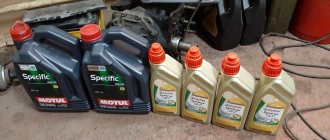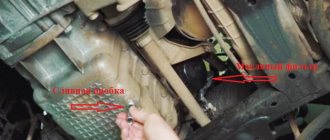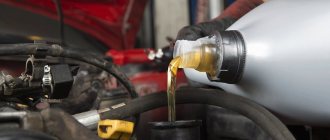What is motor oil for?
The lubricant poured into a car engine must perform 5 functions:
- protect metal from corrosion;
- reduce the rate of engine wear;
- help reduce operating temperature;
- remove fuel combustion waste;
- reduce friction.
In addition, internal combustion engine lubricant can solve other problems. For example, cleaning the engine or neutralizing the resulting chemicals to improve environmental friendliness of emissions. Whether it can cope with them depends on the additives added by the manufacturer.
Semi-synthetic compounds
When deciding what oil to pour into the Niva, many come to the conclusion that artificial compounds have better characteristics. Synthetic formulations may actually be more beneficial. During the development of such oils, complex chemical processes are used, thanks to which the characteristics of the fluid can be adjusted.
If we talk about the advantages of synthetic compounds, it is worth considering that they remain resistant to thermal changes much longer and retain their original characteristics longer. In addition, lubricating fluids of this type contain additional additives that significantly improve the performance of the oils.
Synthetic oils begin to freeze only at -60 degrees. They do not oxidize or evaporate. At the same time, their lubricating index is quite high. In this case, you can actually make replacements much less frequently.
When wondering what kind of oil to pour into a Chevrolet Niva, many are confused, since this car model is a compact SUV. If we talk about semi-synthetic oils, they have the characteristics of the two types described above. They contain 70% synthetic components and 30% mineral ones.
Such compositions are considered optimal for those cars that have a fairly high mileage, but at the same time they have been filled with “synthetics” for too long. Semi-synthetic compounds are changed with varying regularity. This depends on numerous factors. It is important to consider how often the vehicle is used, the condition of the vehicle's powertrain, etc.
However, no matter what kind of oil is poured into the Niva, you must always remember that the more often the lubricant composition is changed, the longer the vehicle will last. Based on all this, we can identify several liquids that are most popular among car owners.
Types of motor oil
Depending on the manufacturing method, there are 3 types of engine oil. They vary in price and performance characteristics.
Mineral
Mineral engine lubricant is made by distilling petroleum.
Thanks to this, it is the cheapest of all compounds. Low price is the only advantage. This product has many disadvantages:
- High viscosity in cold weather, leading to problems with starting and oil starvation of the engine.
- Loss of protective properties at high operating temperatures.
- Shorter replacement interval.
Synthetic
Such compositions are synthesized from esters or polyalphaolefins.
This is the most expensive, but at the same time the highest quality product.
It retains its properties for a long time and is resistant to temperature changes. Such lubricants provide better metal protection due to the fact that the molecules of the base substance from which they are made have polarity.
Semi-synthetic
Semi-synthetic oils are a mixture of mineral and synthetic lubricants. There are no requirements for their ratio. Most often, the amount of the second type of product in the composition does not exceed 20-40%.
This approach allows the price of oils to be reduced enough so that it can compete with mineral oils. At the same time, the combined product significantly exceeds the natural one in terms of performance. It is considered the best option for owners of budget used cars.
Factory standards
At the manufacturing plant, each composition receives 2 types of markings:
- SAE class indicating the viscosity of the product;
- class reflecting the quality of the lubricant.
The most modern options are SN according to API and GF-6 according to ILSAC.
What type of oil to choose for Chevrolet Niva
Mineral oil is extremely undesirable for modern cars, which include the popular Russian SUV. Among the advantages of mineral water, we note its good anti-corrosion and cleaning properties. This lubricant is suitable for engines of cars with high mileage. But in winter, mineral oil thickens quickly, and already at - (minus) 15 degrees. Because of this, problems arise with starting the engine when cold. And to avoid this, you have to warm up the engine for a long time. Mineral oil quickly burns out, and because of this it does not have time to lubricate all the parts, which ultimately remain without lubrication and quickly wear out.
The manufacturer does not recommend using this product for Chevrolet Niva. Synthetic oil is a complex chemical compound with high fluid properties. The liquid is very rare, it quickly penetrates all engine components and lubricates them from all sides. An engine with such lubricant starts faster even in winter, and it does not have to be warmed up for a long time. Such oil can freeze only at temperatures of minus 60 degrees and below. In addition, the product in question has a long replacement interval and has a positive effect on fuel efficiency.
What kind of oil to fill in the Niva Chevrolet engine
Before choosing a lubricant for Niva Chevrolet, you need to carefully read the vehicle data sheet. According to this document, oil with viscosity values from 0W-30 to 15W-40 is poured into the engine. Any type of product will work for this car.
But it is still recommended to give preference to semi-synthetic and synthetic compounds.
There is no mineral lubricant among the original Lada oils.
Main selection criteria
When choosing a lubricant for an internal combustion engine, you need to consider 3 main factors:
- manufacturer's recommendations;
- age and condition of the engine;
- climatic features of the area where the car is operated.
The owner of a new Chevy Niva can choose almost any lubricant depending on his financial capabilities and preferences. If the car has been in use for a long time, you should fill in the type and class of oil that was used before. It is not recommended to suddenly switch from a mineral product to a synthetic one.
Which oil is better to choose - synthetic, semi-synthetic or mineral?
Currently, the lubricants market is saturated with products from many companies, both world-famous and little-known, so choosing engine oil for the Chevrolet Niva becomes a difficult task.
When choosing, you should carefully read the information on the canister, since the parameters and characteristics indicated there can say a lot about the quality of the lubricant.
The lubricant base can be mineral , semi-synthetic or mineral , and based on this, it can have different performance indicators.
Mineral oil is a natural product obtained from petroleum through distillation and refining. Due to the fact that its production technology is quite simple and cheap, mineral lubricant has an affordable price . These liquids create a protective film on engine parts that has good stability. Like other oils, mineral contains a group of additives that give it good detergent and anti-wear properties. In addition, it allows you to get rid of negative compounds and by- products of fuel combustion .
Among the disadvantages , mineral water has only one, but the most significant one is that at low temperatures the lubricant becomes too thick and is poorly pumped by the system. Because of this, difficulties in starting the engine. After starting, thick oil is not able to cover all the parts, so they become oil starved , which results in their rapid wear.
In addition, mineral products quickly lose their performance under severe operating conditions, so they should be changed much more often than synthetic or semi-synthetic ones.
Synthetic oils are produced using a rather complex and expensive technology, so their cost is quite high . At their core, they are produced from natural gas by synthesis and have better characteristics than mineral and hydrocracking products.
To a greater extent, synthetic bases are used in the line of expensive premium quality oils. Synthetics react poorly to temperature changes - they do not lose their performance characteristics for a long time in any conditions. Such products age more slowly and are highly resistant to oxidation.
Semi-synthetic lubricant is based on both mineral and synthetic components.
In terms of performance, semi-synthetics exceed mineral products, but are significantly inferior to synthetics . However, its cost is quite low - which makes this lubricant so popular. If you own a relatively inexpensive car, using this type of lubricant will be completely justified . For new synthetics will be most preferable .
The best motor oils for Niva Chevrolet
There is no need to pour exclusively original Lada oil into the Niva Chevrolet engine.
It can be replaced with lubricant from another manufacturer with the same characteristics.
Or even choose a mixture with a different viscosity if it is more suitable for climatic conditions.
Rosneft
For the Chevrolet Niva, the Magnum Ultratec series marked 5W-40 is best suited. A synthetic product is produced under it. A more economical option is Maximum 10W-40.
Both products have good protective properties that can reduce engine wear even under high loads.
But car owners often speak negatively about its cleaning properties.
Gazpromneft
Gazpromneft Premium N 5W-40 oil is a synthetic mixture from the budget segment. It protects the engine from oil starvation and prevents the appearance of corrosion spots even when using low-quality fuel. Car enthusiasts appreciate this product for its low likelihood of counterfeiting, but note that when using it, problems with starting may occur at temperatures below -25°C.
NGN
The GOLD 5w-40 and NORD series with a viscosity index of 5w-30 are suitable for Niva. These are fully synthetic oils. They create a durable film on the engine that does not drain even when the car is idle for a long time. The additive package used by the manufacturer provides an anti-wear effect on the metal and promotes fuel economy due to better combustion.
Lukoil
For domestic cars, the optimal product from Lukoil is considered to be Lux 5w-40 oil. It is specially designed to protect the engine when operating in urban environments. The composition of the lubricant allows it to create a dense film on all parts, even with frequent stops. The composition includes additives with increased cleaning properties. This should be taken into account by owners of cars with high mileage, for whom the use of such mixtures can be dangerous.
Shell
Experts give a positive assessment to Shell Helix HX8 and Shell Helix Ultra oils with a viscosity of 5W-40. These are fully synthetic mixtures that are characterized by low consumption and minimize engine wear. The Ultra series also has excellent cleaning properties and provides the highest possible protection against sludge.
Valvoline
A good option for Niva would be the SynPower and Maxlife series from Valvoline. These products are characterized by low volatility. They also have high thermal stability and practically do not change their viscosity throughout the entire period of operation.
Zic
Niva owners recommend ZIC X9 5W-40 oil. This is a synthetic product made based on the company’s own developments. The set of additives used in it contains phosphorus, zinc, boron and calcium. The lubricant effectively cleans the engine of old deposits and prevents the formation of new ones.
Castrol
Castrol Magnatec 5W-40 was developed taking into account the climatic conditions of Russia. Ensures easy starting even at temperatures below -35°C. The oil forms a durable film that protects the engine even after long periods of inactivity and when operating in start-stop mode. The product is resistant to oxidation and has low volatility. But some car enthusiasts believe that its price is too high.
Neste
Chevrolet owners prefer the City Standard brand. It is available in different viscosity options and is suitable for harsh winters. The product is designed for use in urban environments. It contains protective additives that remain effective throughout the entire period of operation.
Motul
The 300V line receives the most positive reviews. It produces fully synthetic ester-based oils. This series is positioned as products for sports cars. The lubricant has increased protective properties and does not lose them at elevated temperatures and at high speeds. The main disadvantage of the product is the short replacement interval.
Liqui Moly
The Synthoil High TecH line is a synthetic product based on polyalphaolefins. Drivers note that its use makes the engine much quieter. This effect persists throughout the entire period of operation. It has low soot consumption and an optimal alkalinity number.
TNK
TNK Magnum Motor Plus 10W 40 is a semi-synthetic product developed specifically for VAZ engines. It is suitable primarily for used cars, because... stabilizes engine operation and helps maintain the elasticity of rubber gaskets. The manufacturer uses a viscosity modifier of its own design. This composition ensures high stability of performance even at high temperatures.
Luxe
Chevrolet owners prefer 2 lines of this manufacturer: Hit and Gold. These are semi-synthetic products in the budget segment with good performance characteristics. The additives used in it are capable of filling irregularities in the metal surface, reducing friction, and providing increased protection during low-temperature engine starts. At the same time, the oil has low waste consumption and low volatility.
Selection of oil for the Niva Chevrolet engine
There is also a truth in this story that there are as many opinions on this matter as there are people in the world. This is, of course, exaggerating. But there is some truth in this joke. Some people change their engine oil after five thousand kilometers, others drive the same product three times longer, and their replacement interval occurs only after fifteen thousand kilometers. There are other people who change the engine filler every ten thousand kilometers. There are many variations on this theme.
But the truth is that when it comes to changing the oil, you can’t spoil the porridge with oil, so to speak. Frequent replacement is better than infrequent replacement. But everything determines the capabilities of each car enthusiast individually. Well, there’s little point in replacing it every thousand kilometers, of course, there’s no point.
The most important thing in this story, as all car owners say, is not to run into the wrong oil. Everything else is secondary. Buy motor oil in trusted places, preferably having read all the necessary documentation confirming the quality of the products that are sold to you at a specific retail outlet.
Both options exist. There is nothing difficult in the process of changing engine oil yourself, of course, if you have the appropriate place to carry out this manipulation (this could be an overpass or a lift in the garage).
If this is not possible, then the operation can be performed at a car service station. The procedure is simple and does not cost a lot of money. The only point is to do the specified procedure in a trusted place. Because there are situations when dubious services partially drained the used oil, added some new oil, and that’s it.
Also interesting: Niva tuning: 145 photos of ideas on how to improve the VAZ 2121 with your own hands
https://www.youtube.com/watch?v=ZZd6-ggZs70
These cases are rare, but they do occur, therefore, you should not completely exclude them; if possible, you can attend the oil change procedure to remove such a risk.
Keep in mind that motor lubricant can significantly reduce the friction between moving elements in the motor. Also, automotive lubricant prevents the penetration of the air mixture into the main components of the car engine - for this reason, their rusting is completely eliminated.
It is no secret that while the car is moving, the surface temperature of many (almost all) engine parts involved in this process increases. To reduce the likelihood of excessive heating of important elements of the Chevrolet engine, the oil manufacturer has endowed the lubricant with characteristics that effectively cool all rotating parts.
Synthetic oil is a completely different matter. The manufacturer adds additional additives to this lubricant, which guarantees faster and more efficient processing of all parts of the engine. In addition, the operating time of the engine increases significantly to the maximum value and the level of fuel “eaten” by the machine decreases.
A Chevrolet Niva car requires constant replacement of lubricant - it should be changed after 10 thousand kilometers of driving. However, it may be that an oil change will be required much earlier - a lot depends on the weather and humidity (car operating conditions).
Viscosity is selected according to conditions, and problems may arise with the brand. Which one to use on a continuous basis? To choose motor oil, consider top brands.
The characteristics of mineral oils are quite high in terms of their performance. Thus, such liquids exhibit excellent anti-corrosion properties and have cleaning properties. A significant disadvantage is the fact that at temperatures below -15 degrees the viscosity increases sharply, which can cause difficult starting. Mineral oil also burns quickly, which means it needs to be replaced frequently.
Synthetic fluids obtained through complex chemical transformations. Manufacturers of modern cars recommend using synthetic oils. They are considered more resistant to temperature changes. The main quality of synthetics is manifested in a stable viscosity indicator at different temperatures.
At the factory, the Chevrolet Niva engine crankcase is filled with original GM dexos2 5W30 oil. The plant does not give any recommendations on choosing a manufacturer, but it is recommended to use synthetic oil with a viscosity index of 5W30. Based on the experiences of owners, as well as on the opinions of some experts, a list of oil brands recommended for use in Chevrolet Niva cars was compiled.
Rosneft Maximum 10W-40 is a relatively inexpensive and high-quality synthetic oil, ideal for central Russia with its climatic conditions.
Synthetic and semi-synthetic oil from Lukoil with a viscosity of 5W-40 is excellent for the Chevrolet Niva, although many owners traditionally prefer to choose imported brands. But this is already an outdated stereotype.
Shell is considered the world leader in the production of synthetics. For a Chevrolet Niva, it is recommended to use Shell Ultra or Shell Helix with a viscosity of 5W-30.
The best services for selecting motor oils
To select oils, it is best to use the service offered by an online store with a good reputation (for example, EuroAuto).
To use the service, you need to indicate:
- car make and model;
- engine's type.
After this, the program will offer a list of manufacturers whose product lines contain compounds that meet the manufacturer’s recommendations. The second option is to search for the required tolerances:
- type of base oil;
- product viscosity;
- API specifications.
A similar service can be found in the online store Exist.ru.
Anyone who knows exactly what brand of lubricant he needs can use the selection service posted on the website of the official dealer of this brand. A similar service is offered by all leading manufacturers, incl. Castrol, Lukoil, Mobil.
How to change oil in a Chevrolet Niva engine and which one is better to fill
First of all, it is worth noting that gearbox fluids, even if they are “scorched,” cannot have such a destructive effect. If you choose a low-quality composition for the engine, the consequences will be much more serious.
It is also worth considering that everything depends on the specific car. If one car owner praises the composition that he has been using for a long time for a Mercedes, this does not mean that the same oil is suitable for a Niva. As a rule, it becomes possible to understand that a particular composition is not suitable after 5000 km traveled by the car.
Also interesting: Liquids used and filling volumes Niva VAZ 21213, 21214 and 2131
An important point is how often the composition is replaced. For example, if the car is used as a towing vehicle, often drives off-road and operates the power unit in the most difficult conditions, then the lubricant needs to be changed much more often.
The lubricant used has a direct impact on the life of the internal combustion engine. The correct selection of oil for the Chevrolet Niva engine is the key to long-term and trouble-free operation of the car. You can provide a list of brands of liquids recommended by the manufacturer, but for independent selection you must be able to determine the significant characteristics from the indicated markings.
The engine is the main component of the car, its heart. And for the normal functioning of this organ, a clearly functioning “blood” (oil) system of the engine is necessary. Oil performs a lot of useful functions in a car engine: lubrication of rubbing surfaces (which reduces their wear); protection of engine parts from corrosion, pollution, dust; additional engine cooling.
Every car owner knows that the engine is the heart of the vehicle. The overall performance of the entire car depends on the quality of the engine. This rule must be followed when choosing motor fluid. It is unwise to save money by giving preference to cheap consumables. Such savings can lead to huge financial losses when the motor at some point jams and it stops functioning.
Of course, experienced service station specialists will be able to “resurrect” the car’s engine, however, you will have to fork out for the repairs by paying for the services of these specialists.
To prevent such undesirable consequences, it is better to figure out in time which engine oil is best to pour into the Niva Chevrolet engine, especially since there are several opinions of owners who have such a wonderful car at their disposal.
Correctly selected engine oil for Chevrolet Niva will protect the engine
Keep in mind that motor lubricant can significantly reduce the friction between moving elements in the motor. Also, automotive lubricant prevents the penetration of the air mixture into the main components of the car engine - for this reason, their rusting is completely eliminated.
It is no secret that while the car is moving, the surface temperature of many (almost all) engine parts involved in this process increases. To reduce the likelihood of excessive heating of important elements of the Chevrolet engine, the oil manufacturer has endowed the lubricant with characteristics that effectively cool all rotating parts.
Synthetic oil is a completely different matter. The manufacturer adds additional additives to this lubricant, which guarantees faster and more efficient processing of all parts of the engine. In addition, the operating time of the engine increases significantly to the maximum value and the level of fuel “eaten” by the machine decreases.
A Chevrolet Niva car requires constant replacement of lubricant - it should be changed after 10 thousand kilometers of driving. However, it may be that an oil change will be required much earlier - a lot depends on the weather and humidity (car operating conditions).
Useful tips
Expert advice on choosing engine oil comes down to 3 key points:
- Focus not on choosing the best brand, but on a obviously original product. It is better to buy a lubricant from a more budget-friendly brand in an official store than to try to save money by purchasing a top-end mixture from a dubious retail outlet.
- The more famous the manufacturer, the more careful you need to be so as not to encounter counterfeit goods. Therefore, mixtures from less popular brands are preferable. At the same time, products sold in metal containers are least likely to be counterfeited.
- Choose a product with a minimum viscosity from those recommended by the manufacturer. This will have a positive effect on fuel consumption, especially in winter.
When selecting oil, you need to take into account a number of subtleties. For example, manufacturers often indicate directly on the canister which brands of cars their product is suitable for. There are 2 types of designations:
- “approved” - indicates that the specified automaker conducted an analysis of the lubricant and agreed that it meets the requirements;
- “complies” means that the suitability of the composition for the declared brand is confirmed only by its manufacturer.
Experienced drivers believe that there is no point in choosing exclusively a foreign brand. Russian factories also supply products based on high-quality base oils and containing all the necessary additives.
However, the best option is still synthetic or semi-synthetic. Exotic options (for example, polyalkylene glycol grease or ester compound with the addition of microceramics) are prohibitively expensive and have the same replacement interval. The standard operating mode of the car does not allow their improved protective qualities to be revealed. The use of such products is not financially justified.
As for changing the oil, it is recommended not to coincide with the mileage, but to carry it out if the drop test reveals that the lubricant is unsuitable. This check is performed as follows:
- lower the dipstick into the warm liquid;
- remove the device and drip it onto a coffee maker filter or newspaper;
- If the oil clumps up, it's time to change it.
During such a check, lubricant that has not yet reached the end of its service life will spread in concentric circles.
Characteristics of motor oils
When choosing an oil, you need to understand that there are not only characteristics declared by the manufacturer, but also those that can only be learned from third-party sources.
Viscosity
The determining parameter that is used during selection is viscosity.
The first digit indicates the cold class of the product. The higher the value, the higher the startup temperature. For example, oils with the 5W index are recommended for use at winter temperatures of at least 25 degrees, while 10W oils are only suitable for climates with a minimum temperature of -20 degrees.
The second digit after the “W” index is an indicator of the hot class. Naturally, at high temperatures the oil should be more viscous. This means that the hot class value should be higher.
Coking ability
When the engine operates, deposits in the form of resins and carbon deposits form in the lubricant. Their quantity is determined by such a parameter as coking ability. Unfortunately, it is impossible to independently establish compliance with standards.
Ash content
This characteristic shows how large the proportion of additives in the oil is that form ash deposits during combustion. The ash content of the lubricant is indicated in Latin letters. Oils with high ash content are marked with the index “A”, with medium and low ash content – “C”.
Cleaning properties
Any motor oil not only reduces friction, but also must “wash” the engine from the inside. The cleaning properties of oils can only be determined during bench tests, so when selecting, you have to rely solely on the authority of the manufacturer.
Watch this video on YouTube
Reviews from car owners
All brands listed in the review received only positive reviews from Chevrolet owners. Energy-saving qualities and a positive effect on the engine were noted: quieter operation and easier starting in winter. Experienced car enthusiasts speak negatively about the use of mineral compounds. The general consensus is that they increase fuel consumption and worsen the condition of the engine.
In your experience, how justified is the purchase of expensive formulations?
- What kind of oil to pour into the 126 Priora engine
- TOP car seats for children
- Better decoking of piston rings
- Rating of online auto parts stores
- Motor oil 5w40 synthetic
- Liquid sealant for car cooling system
- What kind of oil to pour into the engine
Mineral lubricants
The most important characteristic that you need to pay attention to when choosing a lubricant is its viscosity. If we are talking about oil, the composition must meet the requirements of international quality standards SAE J306. This type of certification was developed in the USA and is generally accepted today.
When deciding which oil to pour into Niva axles and other components, you need to evaluate the viscosity of the composition. According to the standards, the letter “W” corresponds to this indicator. As a rule, such a symbol is indicated on seasonal compositions. If there is a letter “W” on the package, this indicates that the liquid can be used in winter. In the absence of this symbol, oil may only be used in positive ambient temperatures.
Based on this, many believe that seasonal lubricants are much better. However, this is not quite true. The fact is that when operating any car, you need to change the oil even before it has exhausted its service life. Therefore, you should not be happy if the composition does not change its characteristics throughout the year.
All-season formulations are also on sale. These are the so-called thickened oils. They have the characteristics of both summer and winter lubricants.
Also interesting: Various options for tuning the Niva 21213 and 21214 engine
It is equally important to pay attention to the performance properties of oils. In this case there are also certain standards (APIs). Also, when deciding what kind of oil to pour into the Niva, it is worth considering its composition.
Of course, it is logical to assume that the more natural the composition, the better it will be. This fact is confirmed by the unique properties of oils of this type. When using mineral compounds, contacting parts will deteriorate much more slowly. In addition, the so-called natural compounds have excellent anti-corrosion properties.
There are also those car owners who believe that mineral oils are not able to cope with heavy loads. But it is worth considering that during the internal combustion process, many mineral deposits are formed in the engine, which negatively affect the operation of the power unit. Mineral oils may indeed not be able to cope with serious “build-ups” of burnt particles. However, if we are talking about a car with low mileage, then “mineral water” will be quite enough.
Also, when choosing which oil to pour into the Niva transfer case or car engine, it is worth considering that mineral compounds cannot be used in the cold season. This is explained by the fact that this type of lubricant composition begins to thicken greatly at temperatures below -15 degrees. Because of this, the mechanisms cannot function normally. The use of such oils may result in the power unit having to warm up much longer.
Another disadvantage of mineral compositions is that they sometimes fade. Accordingly, the lubricating characteristics of the liquid decrease. This will lead to the components starting to wear out much faster, and fuel consumption will increase. In rare cases, even damage to the power unit may occur. Thus, it is recommended to use mineral-type compounds only at not very low temperatures and for cars with low mileage.
The best synthetic motor oil for Chevrolet Niva
First, let's look at synthetic motor oils for the Chevrolet Niva, which are recommended by the manufacturer and have received positive reviews from SUV owners from GM-AvtoVAZ. When compiling this review, our experts also took into account the product characteristics.
GENERAL MOTORS Dexos2 Longlife 5W30 5 l
GM specifically developed this product for use in its car brands, such as Opel, Cadillac, Chevrolet. Synthetic oil is equipped with a special package of additives that prevent aging of the technical fluid. This is especially important for engines in the Chevrolet Niva, which are designed for an increased interval between maintenance. The Dexos2 approval is clearly indicated on the canister, which guarantees full compatibility of the lubricant with the requirements for the engine. The composition is suitable for 1.7 and turbocharged 1.8 engines equally.
This is the best option in terms of price and composition, and is original. The oil is specially developed for the Chevrolet line, including the Niva model. Owners note in reviews that the product lasts its entire service life (15,000 km) and does not lose its properties before an upcoming replacement. The oil has a moderate viscosity in cold weather, which serves as protection against abrasion of the piston rings. The product has a decarbonizing effect.
Advantages
- optimal price for 5 l;
- good cleaning properties;
- works throughout the entire service life;
- Provides easy starting in cold weather.
Flaws
- only a slight reduction in engine noise;
- it is inconvenient to hold the canister when pouring oil;
- many fakes;
LIQUI MOLY Optimal Synth 5W-40
In second place in the review is a product from a German brand. Before being released onto the market, the oil was tested on turbocharged engines and provides excellent power with minimal harmful emissions. The synthetic composition protects the engine from scuffing and premature aging. At low temperatures, instant lubrication occurs. Owners of the Chevrolet Niva in the reviews like the easy start of the internal combustion engine in winter and the ability to mix this oil with any other synthetic oil if a sharp drop in the level is detected and topping up is required.
This oil is the best for Chevrolet Niva, because it contains a package of the latest additives that the manufacturer developed specifically for cars used in Russia. The product is called Optimal Synth, due to the optimization of the composition for the temperature range of the Russian climate and the characteristics of machine operation. Viscosity 5W-40 ensures the correct consistency both in frosts up to -25 degrees and in heat up to +40 degrees. In the latter case, the oil density will be 87.5 mm²/C, which is quite dense.
Advantages
- two handles on the container for carrying and refilling;
- suitable for use all year round;
- goes well with powerful motors;
- different packaging.
Flaws
- hardens at -36 degrees;
- There are many fakes that differ in the text font or location of the codes.
SHELL Helix Ultra ECT C3 5W-30 4 l
Next is oil for Niva Chevrolet engines from SHELL. The product is available in containers of 1 and 4 liters. The label below contains the Dexos approval, indicating compatibility with GM engines. Two handles on the canister are convenient for carrying the tank and turning it over while pouring into the crankcase. Synthetic oil is produced in one of different countries around the world. For Russia, supplies are made from Turkey or Germany. Synthetics provide optimal fluidity and reduce the toxicity of exhaust gases, since they almost do not burn. To manufacture this product, the manufacturer uses a new patented Shell Pure Plus technology. This means that the composition contains active detergent additives that ensure high engine cleanliness.
How to change oil in a Chevrolet Niva engine and which one is better to fill
Replacing fuel and lubricants in Niva is practically no different from changing lubricant in any other car. All work can be done with your own hands, without contacting service station employees.
- Not less than 4 l;
- Hexagon;
- To remove the oil filter, you will need a special wrench;
- Container for used lubricant;
- New filter;
- Funnel, rags and brush.
- Remove the plug from the neck;
- Unscrew the cap from the grease filling hole;
- Remove the crankcase protection;
- We place the prepared empty container under the drain hole;
- Remove the plug and then unscrew the drain cap;
- We wait until the used oil is completely drained;
- Remove the old filter;
- Fill the new filter about 1/3 full with oil;
- Fill the engine with new oil;
- We tighten all the covers and install the plugs in place;
- We check the plugs with the engine running - there should be no leaks anywhere;
- After the car has been running for several minutes, we take a control measurement of the level using a dipstick;
- That's it, the oil is filled.
If we are talking about the Chevrolet Niva, the manufacturer recommends changing the oil every 15,000 km. In this case, manipulations must be carried out in accordance with the clear recommendations of specialists.
First of all, you need to place the car on a viewing hole or lift. When the car is secured and cannot accidentally move, you can remove the engine protective cover located at the bottom. After this, you need to place a container under the hole (a 5-liter canister is best) and unscrew the drain plug.
When the fluid is renewed, it is necessary to install the element in place of the old one. The next step is to replace the seal. After this, you can tighten the drain hole and return the protection to the engine.
Next, you need to open the neck and pour about 3.5 liters of lubricant into it. That's not all.
After all the manipulations, you need to start the car engine and wait until the power unit warms up. When a little oil is gone, add a little more compound and leave the engine running for another 10 minutes. After this, the oil level is checked again (it is best to use a special dipstick). If there is not enough liquid, you need to add it.
Also take into account the viscosity index. It should be chosen based on the outside temperature. Which one is worth purchasing from Chevrolet? Let's look at many well-known types of oils at once to understand which one is best to use.
Read news about the new Niva
- Chevrolet Niva what oil is in a Chevrolet engine
- The new crossover Lada Niva 4x4 Vision 2021 was shown immediately after Niva Travel entered the market " "
- New Lada Niva 4x4 2021 (LADA Niva 4x4): photos, technical specifications, price, release date - video
- The production of the anniversary Niva was launched... in Germany
- The design of the new generation Lada Niva has been approved, will it be without Xs? » Lada.Online - all the most interesting and useful about LADA cars
- Fanatics rushed to snatch up lights from LADA Niva Travel - Society - AutoVzglyad
- Buy Lada Niva Travel Luxe 1.7L/80 5MT 5W Borneo - Silver-dark gray metallic Order No. 260121-VZM16 - Price, availability, description - Major Auto - official Lada dealer
- Replacing a Chevrolet Niva pump, step-by-step instructions (photos and videos).
The best semi-synthetic motor oil for Chevrolet Niva
For Niva Chevrolet SUVs, you can also use semi-synthetic compounds, which are slightly cheaper than synthetics, but perfectly protect the engine from wear. Here are the best products in this category.
LIQUI MOLY Molygen New Generation 5W-40 4 l
This semi-synthetic motor oil from a German manufacturer belongs to the premium class, despite the mineral base in the composition. In addition to approval for the Niva, it is officially approved for use in such brands as Porsche, BMW and Volkswagen, which are in a class higher than the Niva Chevrolet model. Car owners in reviews note a noticeable increase in power, which gives an increase in dynamics. This is especially felt in the Niva models of 2002-2009, equipped with an internal combustion engine with 125 hp. The substance has no friction losses due to its low-viscosity state.
Our experts consider this engine oil to be the best for use in new Chevrolet Nivas that have just left the showroom. If you pour lubricant into a new engine from the very beginning, you will be able to delay major repairs as much as possible, perhaps up to 400 thousand km. This is achieved through Molygen New Generation technology (molybdenum additive), which creates a durable film on the surface of rubbing parts. The protective coating does not disappear when the machine is idle for a month without operation or when there is a strong temperature difference.
Advantages
- easy start in winter;
- high stability at temperatures -30. +40 degrees;
- reduces exhaust toxicity;
- optimally protects against wear.
Flaws
- high price;
- there are fakes.
SHELL Helix HX7 5W-40 4 l
If you are a fan of quality products from the British brand SHELL, then pay attention to the product Helix HX7 5W-40. The semi-synthetic base is equipped with protective additives that create a durable film. In addition, the technical fluid is not prone to the formation of solid deposits or contamination of the discharge. GM approval is expressly stated in the product specifications. Easy cold starting of the engine is ensured by increased fluidity. Service station technicians in their reviews praise the product for its constant viscosity throughout its entire service life. The manufacturer claims that this lubricant has a protection level that is 19% more effective compared to similar products from competing brands.
This oil from a British manufacturer has active cleansing properties. The engine of your Chevrolet Niva will remain shining from the inside, despite the dubious quality of gasoline. We recommend that those who have to travel a lot around the country and refuel in untested places take a closer look at the product.
Advantages
- sold in volumes of 1, 4 and 20 l;
- increased efficiency of the internal combustion engine;
- has antioxidant stability;
- rapid supply of oil to the channels upon startup.
Flaws
- high price;
- It is recommended to replace it after 1 year, even if the mileage is not checked.
LUKOIL Lux semi-synthetic SL/CF 5W-40 4 l
This category is completed by a domestic product from LUKOIL. Semi-synthetic motor oil with ACEA A3B3 classification is made from base mineral oils obtained in Russia and a set of additives of foreign origin. The optimal composition makes it suitable for pouring into the crankcase of both types of engines used in the Chevrolet Niva. Active substances prevent the formation of solid deposits on the internal surfaces of the engine. If you have a Niva Chevrolet with a catalyst, then it will not become additionally contaminated with such a lubricant.
This oil is the best for Chevrolet Niva in terms of cost. If you don’t want to ruin your engine, but at the same time don’t want to overpay for imported brands, then this is the best option. You can switch to it regardless of the age of the car, and in the case of an already slightly worn-out engine, it is even useful, since it will burn less than 5W30, which has increased fluidity.
Source











